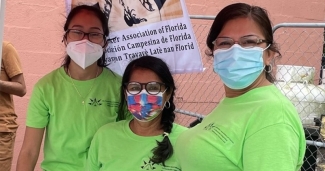Partner Spotlight: Our Partners in Florida
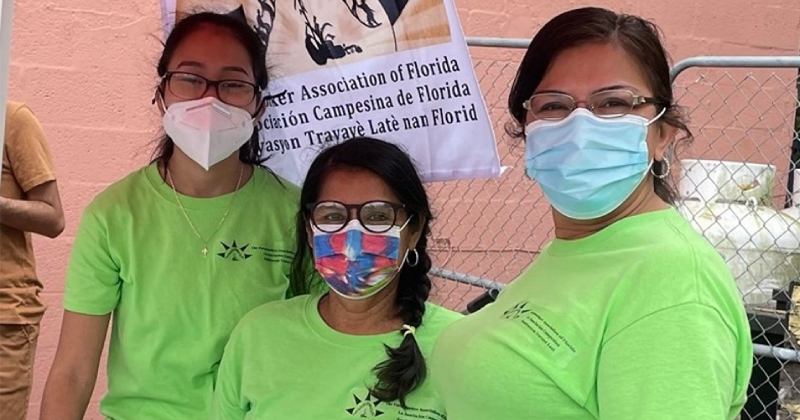
[Editor’s Note: Since July 2021, Alianza Nacional de Campesinas , Migrant Clinicians Network (MCN), Rural Coalition and 20 organizational partners and members have mobilized 221 community health outreach workers across 20 states and Puerto Rico to encourage vaccination within rural communities of color including Black and Indigenous communities through a learning collaborative. Funded by an $8.1 million grant from the Health Resources & Services Administration, the effort aims to raise vaccination rates among immigrant and migrant farmworkers and rural communities of color through reinforcing COVID-19 information, addressing vaccine hesitancy and accessibility, and assisting in countering misinformation and disinformation.]
For rural health initiatives, partnership and collaboration are vital tools for getting people vaccinated and meeting the needs of communities where these initiatives operate. In Florida, many rural communities are home to farmworkers, immigrant workers, and their families. Many speak Spanish, Haitian Creole, or other languages at home. Initiative organizers need to have an intimate knowledge of the community, their needs, and the avenues through which help should be delivered, in order for public health campaigns to have success. Long-standing public health organizations, like many of those involved in Migrant Clinicians Network’s learning collaboratives, have built strong bonds with community members by leveraging pre-existing relationships and partnerships. These valuable bonds support the fight against COVID-19 in communities. In addition, through new and expanded partnerships, even long-standing public health organizations and nonprofits have amplified their reach to help more people.
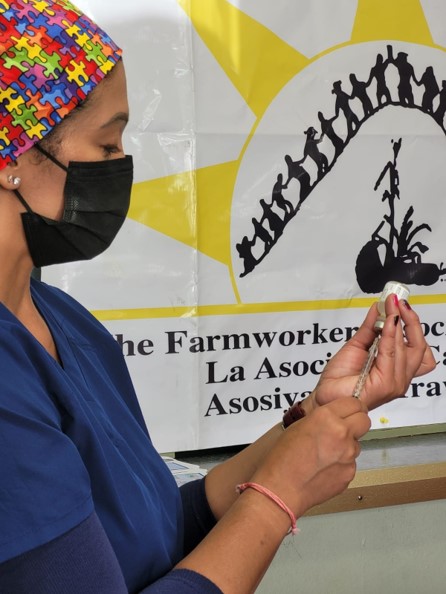
Our partner, the Farmworker Association of Florida (FWAF), works to end labor, health, and environmental justice issues in a continual effort to improve the lives of farmworkers. Operating in a handful of rural counties in Florida, during the pandemic, the organization has focused much of its efforts towards health justice for farmworking communities.
FWAF has worked in Florida communities for over two decades, but the success of their work relies on their allies. Their many partners include local community health workers and other clinicians who volunteer their time to administer vaccinations within local, vulnerable, and rural communities. During FWAF’s presentation at an MCN-led learning collaborative, FWAF shared the work of one such local physician who comes to vaccination events to help with distribution. The doctor often brings a cooler of vaccines to FWAF-hosted events to help increase vaccination rates within the community. At the learning collaborative, FWAF also noted growing partnerships with several grocery chains, including Winn Dixie and Publix, as well as pharmacies like CVS. FWAF has been able to hold vaccination events at these local and easily accessible grocery and pharmacy locations with help from the Health Department of Miami-Dade County, Treasure Coast Community Health, and the Consulate of Mexico to name only a few of their allies.
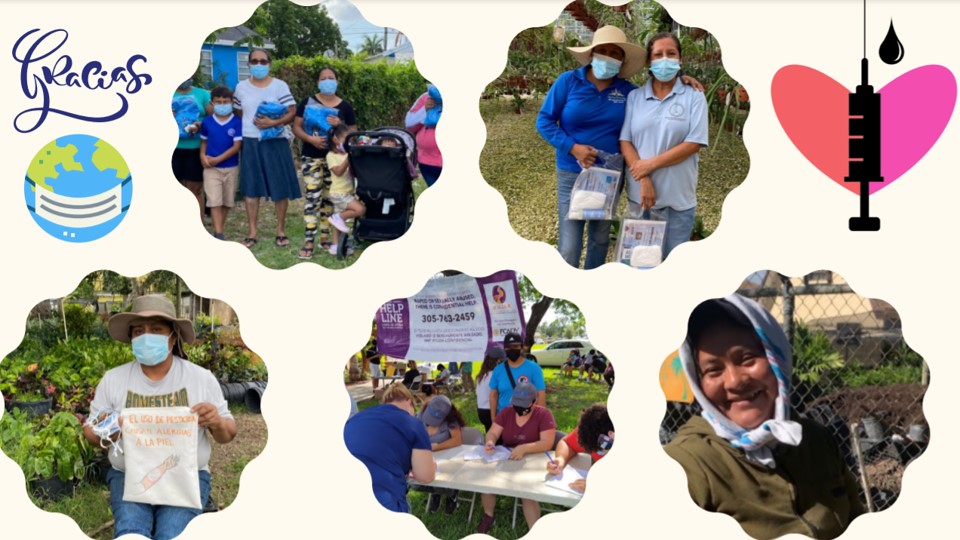
Grupo A.M.O.R., another MCN partner in the state of Florida, shares a similar focus to FWAF for farmworker health and labor rights. Based in Homestead, Grupo A.M.O.R. is in the heart of a largely Spanish-speaking community with complex and varying needs that the organization is working to meet. During the pandemic, Grupo A.M.O.R. has worked to distribute food, provide information on vaccination to workers in the area, and aid families by providing children with school supplies. Grupo A.M.O.R. also focuses on women’s health, providing resources to help women in the community detect breast cancer early, as well as community health work to reduce the spread of HIV/AIDS. This longstanding organization’s role in local women’s health has given them a trustworthy reputation within the community. This allows them to share honest and positive information about how individuals can protect themselves and their families from COVID-19, that is well received.
Both Grupo A.M.O.R. and FWAF work with Alianza Nacional De Campesinas and the Rural Coalition in order to best serve their communities. Funding and resources, as well as best practices and knowledge that come from these larger, nationwide organizations and networks, aid Grupo A.M.O.R. and FWAF in their efforts. Grupo A.M.O.R. and FWAF often shared their experiences utilizing strategies and content developed by their partners, as well as strategies developed from their own experiences, at the MCN-led learning collaboratives. By continuing to provide resources that communities count on and by working to advance COVID-19 knowledge and vaccination resources, these organizations have been able to make a tremendous impact. Pre-existing trust and coalition building, as well as the flexibility to create new partnerships, are vital strategies for success in the campaign against COVID-19 and for increasing vaccination throughout the nation. These long-standing organizations have made an incredible difference within Florida.
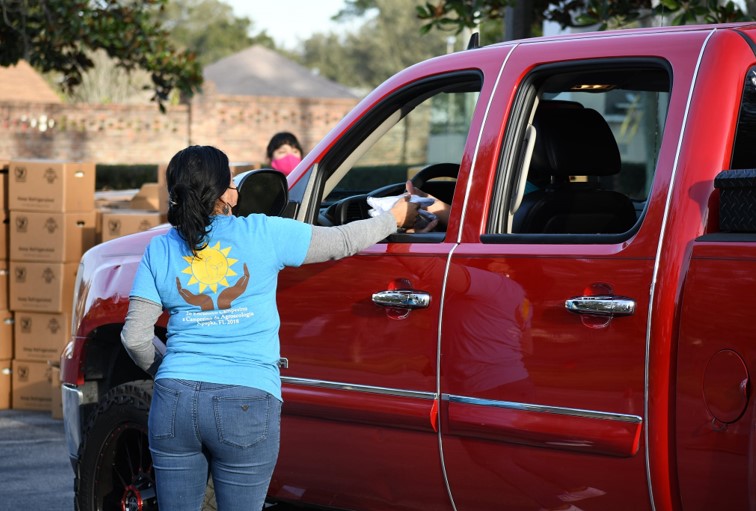
Each week MCN facilitates a bilingual learning collaborative that offers partners access to clinical staff, other experts, an extensive library of fully editable COVID-19 resources, evidence-based COVID-19 updates, and extensive communications and marketing technical assistance to support partner’s use and adaptation of resources to fit their community’s needs. Each organization shares learning collaborative content and activities with their frontline community health workers, who tirelessly promote COVID-19 vaccination in the counties, towns, and neighborhoods where they live. This blog series highlights best and promising practices used by grant partners across the country, which are shared at the learning collaboratives, creating a diverse learning environment.
This is supported by the Health Services and Resources Administration (HRSA) of the U.S. Department of Health and Human Services (HHS) as part of an award totaling $8,105,547 with 0% percentage financed with non-governmental sources. The content are those of the author(s) and do not necessarily represent the official views of, nor an endorsement, by HRSA, or the U.S. Government. For more information, please visit HRSA.gov.
Got some good news to share? Contact us on our social media pages above.
Return to the main blog page or sign up for blog updates here.
- Log in to post comments
